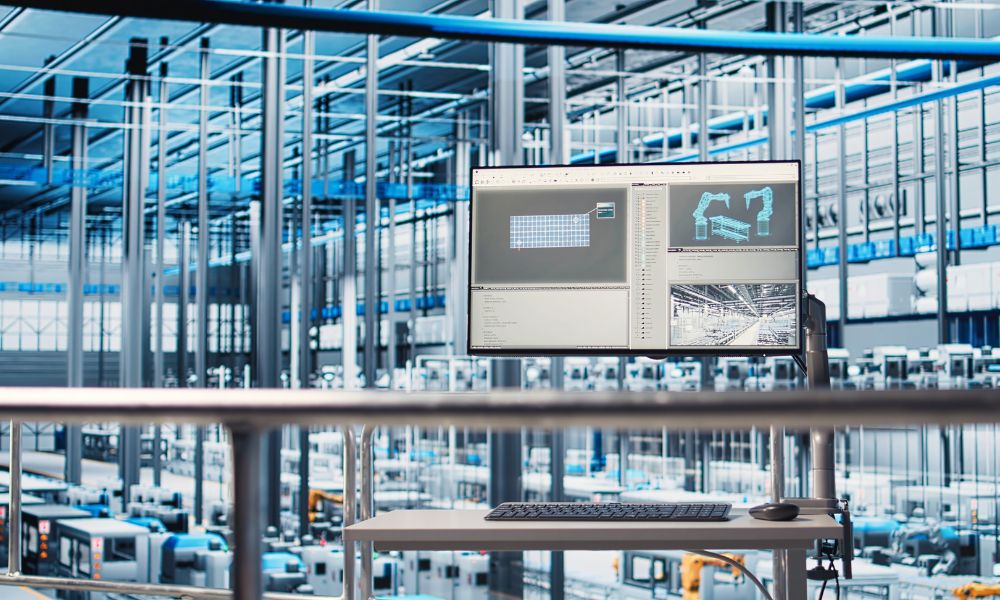
4 Ways AI Will Change the Future of Manufacturing
August 4, 2025Artificial intelligence is revolutionizing industries worldwide, and manufacturing is no exception. With its ability to process vast amounts of data, predict outcomes, and streamline operations, AI has the potential to transform the way factories operate.
For manufacturers, AI is about unlocking new levels of efficiency, innovation, and customer satisfaction. Below, we’ll outline some of the most impactful ways AI will change the future of manufacturing, from predicting maintenance to quality control and more.
Predictive Maintenance
One of the most significant ways AI is transforming manufacturing is through predictive maintenance. Equipment failures cause costly downtimes and disruptions. Manufacturers rely on scheduled maintenance, which can mean unnecessary repairs or missing issues until it’s too late. AI uses sophisticated machine learning algorithms to analyze data from sensors embedded in machinery.
These algorithms can detect subtle patterns that indicate potential failures before they occur. AI tools monitor equipment changes in real-time, allowing businesses to conduct maintenance only when necessary. This approach reduces downtime, extends the life of machinery, and significantly lowers maintenance costs.
Automation and Robotics
AI-powered automation and robotics also boost productivity and efficiency to new levels. Unlike traditional machines, AI-driven robots learn from data, making them adaptable, flexible, and capable of handling complex tasks. For instance, AI-powered robotics can assemble products with precision and detect defects during the production process.
Beyond repetitive tasks, collaborative robots, also known as “cobots,” can work safely alongside humans. Using AI, these cobots enable seamless interaction, combining human creativity with robotic consistency.
Quality Control
Another way AI will change the future of manufacturing is by offering accuracy and scalability in quality control. With computer vision systems, AI detects even the smallest defects in real-time, analyzing data points such as dimensions, texture, and patterns that the human eye might miss.
AI also enables predictive quality control, identifying trends that lead to flaws and addressing issues before defects arise. This proactive approach reduces waste, enhances customer satisfaction, and ensures compliance with industry standards. By transforming quality control processes, AI enables manufacturers to save time and money while setting a new standard for excellence.
Supply Chain Optimization
The manufacturing supply chain is a complex system of suppliers, logistics, and distribution channels, and AI is transforming it to be faster, leaner, and more efficient. By analyzing data across the supply chain, AI algorithms can predict demand, manage inventory, and optimize logistics. For instance, AI can analyze historical sales data and external factors, such as seasonal trends, to forecast demand, enabling manufacturers to fine-tune their production schedules and avoid overstocking or shortages.
Traceability, for example, is incredibly important in logistics and supply chain organization. One way to ensure traceability is with permanent markings, like laser marking systems. AI is a cornerstone of the future of industrial laser marking systems, by optimizing marking solutions, identifying defects in real-time, and more. AI-driven supply chain optimization is becoming increasingly essential for manufacturers seeking to remain competitive and responsive.
AI is the Future of Manufacturing
The manufacturing industry is undergoing a transformation with AI, from preventing costly downtime through predictive maintenance to enabling precise quality control and optimizing supply chains. These advancements drive efficiency and position AI as essential for the future of manufacturing. If your business hasn’t yet embraced AI, now is the time to act and stay competitive, preparing for future challenges.




